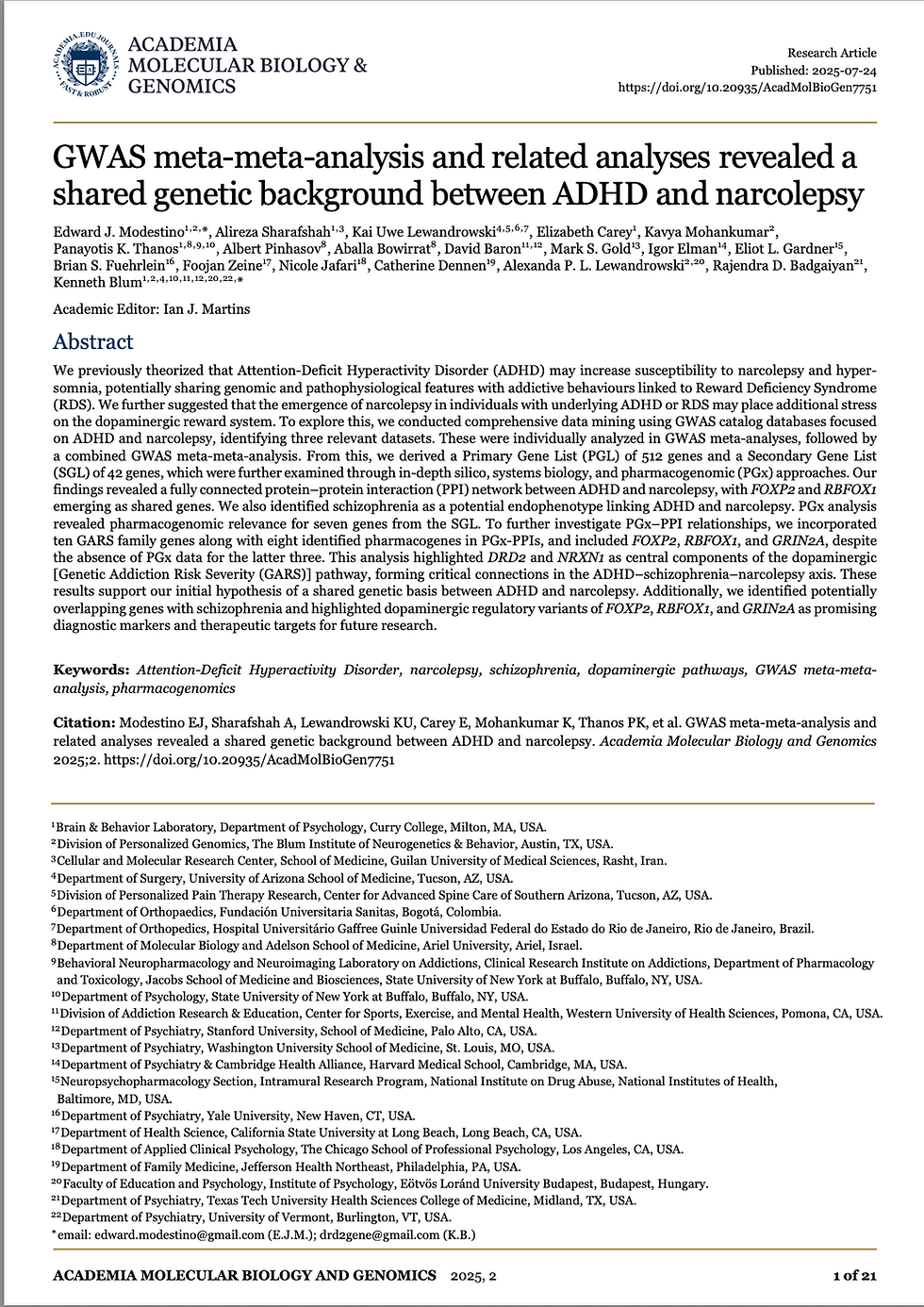Can treating ADHD extend one's lifespan?: A Launching Point for Discussion
- Edward Justin Modestino, Ph.D.

- Mar 20, 2024
- 3 min read
My wife Danielle ran across this interesting article asking, "Could ADHD drugs reduce the risk of early death? Unpacking the findings from a new Swedish study." Here is a link to the article (Vally, 2024). Here is a link to the original study that the article used as a launching point (Li et al., 2024). Finally, here is a link to an older study showing the same decreased mortality (Chen et al., 2020). For us, this was a clear launching point for discussion as well.

In the B&B Lab, ADHD is the focus of much of our research with RDS, RSD, and ADHD with comorbid narcolepsy. In fact, The Bruce Steinberg EEG Laboratory in the Department of Psychology at Curry College has focused much of its research on ADHD. Here is an example of that research. Interestingly, many of the lab members in the B&B Lab have diagnoses of ADHD. Some employ a regular medication regimen; some use treatment sporadically, and others use no pharmacological treatment.
Certainly, if your frontal lobes are underactive due to ADHD (Arnsten, 2009), you are not fully awake (underaroused), and your attention span is notably compromised to the point where you can miss important things related to your safety and be more accident-prone. The conclusion of this study by Li et al. (2024) was "Among individuals diagnosed with ADHD, medication initiation was associated with significantly lower all-cause mortality, particularly for death due to unnatural causes." The fact that it decreases all causes of mortality, such as medical conditions and diseases, is interesting as this suggests it is not only due to "unnatural causes." In 2023, the CDC listed unintentional causes of death to include: "unintentional poisoning (e.g., drug overdoses), unintentional motor vehicle (m.v.) traffic, unintentional drowning, and unintentional falls" (Centers for Disease Control and Prevention, 2023). Unnatural causes of death include "unintentional injury, suicide, and homicide" (Roth et al., 2024). But, exactly how treating ADHD leads to decreasing death from diseases or medical conditions is unclear and may only be speculative at this point.
The researchers in this study gathered their information from medical record databases. So, this research is correlational and does not show true causation (Wilson, 2014) as there could have been other factors that were not controlled for as in a true experiment. Could it be that those who sought out medication for their diagnosed ADHD were more conscious of their health (therapy, exercise, diet) or had a greater social support system due to personality traits that mediated these differences in mortality? These factors need to be explored in future research.
References
Arnsten, A. F. T. (2009b). ADHD and the prefrontal cortex. The Journal of Pediatrics, 154(5).
Centers for Disease Control and Prevention. (2023, October 25). Injuries and violence are
leading causes of death. Centers for Disease Control and Prevention.
https://www.cdc.gov/injury/wisqars/animated-leading- causes.html#:~:text=Unintentional%20injuries%20include%20opioid%20overdoses,vehicle%20crashes%2C%20and%20unintentional%20falls.
Chen, V. C.-H., Chan, H.-L., Wu, S.-I., Lu, M.-L., Dewey, M. E., Stewart, R., & Lee, C. T.-C.
(2020). Methylphenidate and mortality in children with attention-deficit hyperactivity
disorder: Population-based Cohort Study. The British Journal of Psychiatry, 220(2), 64–
Li, L., Zhu, N., Zhang, L., Kuja-Halkola, R., D’Onofrio, B. M., Brikell, I., Lichtenstein, P.,
Cortese, S., Larsson, H., & Chang, Z. (2024). ADHD pharmacotherapy and mortality in
individuals with ADHD. JAMA, 331(10), 850. https://doi.org/10.1001/jama.2024.0851
Roth, K. B., Kahn, G., Storr, C. L., & Wilcox, H. C. (2024). Childhood factors associated with
unnatural death through Midadulthood. JAMA Network Open, 7(2).
Vally, H. (2024, March 19). Could ADHD drugs reduce the risk of early death? unpacking the
findings from a new Swedish study. PsyPost. https://www.psypost.org/could-adhd- drugs-reduce-the-risk-of-early-death-unpacking-the-findings-from-a-new-swedish-study/?utm_source=dlvr.it&utm_medium=facebook
Wilson, M. (2014, May 13). Hilarious graphs prove that correlation isn’t causation.



Comments